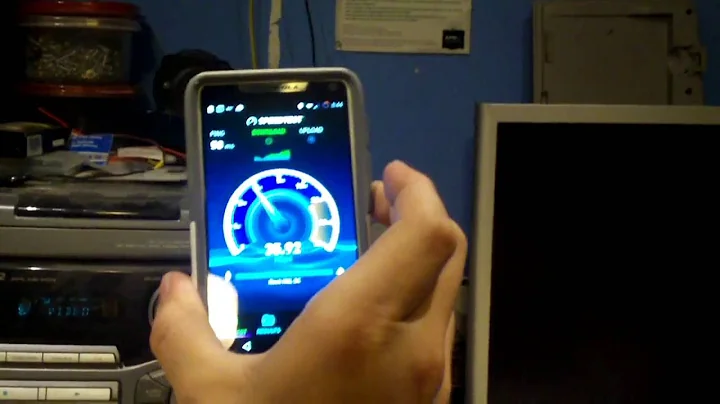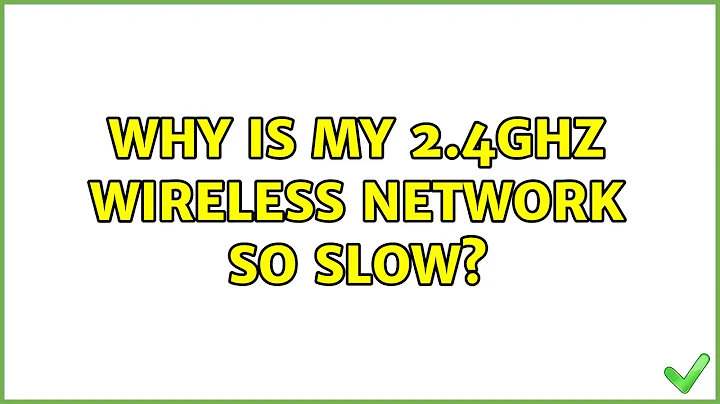Why is my 2.4GHz wireless network so slow?
Solution 1
There are several possible reasons here:
You might be competing with other users in the 2.4GHz band.
This can be other wireless users, Bluetooth, microwaves or even other devices which use the 2.4GHz bands.You might simply have a poor 2.4GHz NIC (either the hardware or the driver).
In that case, another brand/model 2.4GHz wireless NIC would work faster.Something else slows it down (e.g. same slow speed when copying files to the machine with the slow NIC when you copy from wired, from a pen drive etc etc might indicate that the disk is failing and that the network slows down to match the writing to disk. In that specific case, it probably starts faster while buffers are filled but there are many possible reasons). Please test.
Lastly, signal strength might be indicated as 'excellent' but the signal might actually be quite poor. (e.g. due to reflections. Imagine a room with an echo. You can speak loudly and your 'voice strength' might be excellent, but with all the echos you are hard to understand, leading to many questions 'what did you just say, please repeat' and to slow communication).
Solution 2
On 802.11g (standard 802.11g without frame bursting), even at great signal strength, no noise, always getting the 802.11g max 54 Megabit/sec PHY rate, no contention, and very efficient and well-tuned software, your maximum TCP/IP throughput is likely to be only around 23 Megabit/sec (about 2.7 MebiBytes/sec). If both machines are wireless, on the same AP, every packet would have to traverse the channel twice, cutting the bandwidth in half, for an effective throughput of about 1.4 MebiBytes/sec. If you were using a protocol that is not optimized for efficient file transfers, such as a remote filesystem protocol like SMB, that might cut your effective throughput significantly as well.
Overall, it's really easy to get down to a 256 KibiByte/sec throughput wireless-to-wireless SMB file copy speed over 802.11g under everyday, imperfect conditions. Those speeds may have seemed fine to users in 2003 when 802.11g was new, but they suck by 2013's 1300 Megabit/sec 3-stream 802.11ac standards.
Related videos on Youtube
neubert
Apparently, this user prefers to keep an air of mystery about them.
Updated on September 18, 2022Comments
-
neubert over 1 year
I am trying to copy a 300MB file from one computer to another via 802.11g / 2.4GHz. My transfer speed is 256KB/second. My signal strength is reported by Windows as excellent.
Any ideas as to why it's so slow?
In contrast, on another computer with 802.11n / 5GHz, I'm getting in excess of 9MB/second.
-
Paul over 9 years2.4Ghz is prone to saturation. If there are others nearby on the same channel, that might be the cause.
-
Spiff over 9 yearsWhat file transfer protocol are you using for the transfer (FTP, SFTP, SCP, rsync, NFS, AFP, SMB)? What does your software report as the current PHY rate? Be careful not to read the fastest speed the link is capable of (54Mbps for 802.11g) but the actual rate you're currently getting. Are both machines wireless? On the same access point? Did you try switching your AP to a cleaner channel?
-
neubert over 9 yearsSMB. idk how to get the PHY rate. One machine is wireless - the other is 100mbit cat5. I have not tried changing the channel - I'll try that when I get home!
-
-
neubert over 9 yearsFWIW it's not actually wireless-to-wireless - it's wireless-to-wired.
![How to Make Your Laptop's Wifi Signal Faster On Windows 10/8/7 [Tutorial]](https://i.ytimg.com/vi/Zxe99zn5B0U/hq720.jpg?sqp=-oaymwEcCNAFEJQDSFXyq4qpAw4IARUAAIhCGAFwAcABBg==&rs=AOn4CLAn_LdNrq74XG25X6JnPIP8Ymy0EQ)
![How to Change From 2.4ghz to 5ghz Wireless Network Adapter in Windows 10/8/7 [Tutorial]](https://i.ytimg.com/vi/86YcU_4v0vE/hq720.jpg?sqp=-oaymwEcCNAFEJQDSFXyq4qpAw4IARUAAIhCGAFwAcABBg==&rs=AOn4CLAvCZfTa7TcJZ6Y3g2Jr-Plx0l2zA)


